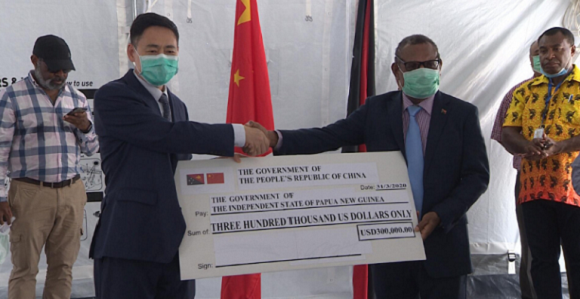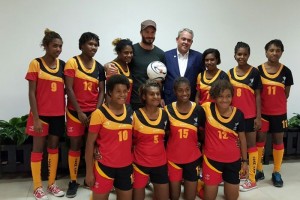Australia’s new government has made it clear that its approach to its relationship with the Pacific will have a new type of engagement. Will it give it a chance to fight the influence of China in the region? Political consultant Jeffrey Wall explores.

China donated funds and medical materials to aid PNG’s COVID response. Credit: LOOP
I have felt significant pessimism at Australia’s capacity to slow, let alone stop, China’s expansion in the Pacific, and particularly the South Pacific.
It is early in the life of the new Australian Government, but I have moved from pessimism to optimism. Its new Foreign Minister, Senator Penny Wong, deserves much of the credit for that.
The contrast between the approach to the region, and China’s influence, by the former Foreign Minister and her Labor successor could hardly be greater.
In four weeks, Senator Wong has visited four South Pacific nations (Fiji, Tonga, Samoa and the Solomon Islands). In the last three years, Senator Marise Payne visited just three Pacific nations.
Payne left engagement with the region to a junior minister, something which was a constant source of irritation, especially in Papua New Guinea and Fiji.
I agree with them. It is not insignificant that the lion’s share of China’s engagement with the region is undertaken by their Minister for Foreign Affairs.
‘Sport has the potential to greatly enhance Australia’s engagement in a way that China cannot hope to.’
In recent years, China has elevated the Pacific, and especially the South Pacific, to a high status in its foreign policy agenda. Until quite recently, Australia simply had not done the same – a serious error.
It is inevitable that Senator Wong will allocate some of the responsibility for regional engagement to the Minister for the Pacific and International Development to one of her junior ministers, Pat Conroy MP.
It is to be hoped she will maintain an activist hands-on approach to engagement with the region. It will not have escaped her notice or that of Prime Minister Anthony Albanese that she has been extremely well received by regional leaders.
She has shown them a level of respect that was just not in evidence in recent years.
Sport connection

PNG’s under-20 women’s soccer team and sports minister Justin Tkatchenko in Mount Hagen. Credit: Facebook/Justin Tkatchenko
The Australian Government is clearly developing a series of policies that will appeal to the Pacific. Hopefully, the policies will focus more on greater people engagement and less on cash aid.
As I have written, sport has the potential to greatly enhance Australia’s engagement in a way that China cannot hope to.
Nothing better illustrates this ‘potential’ than the test matches between PNG, Fiji, Tonga and Samoa played in Australia recently. The tests are receiving both free-to-air and pay television coverage in Australia and across the South Pacific.
A moderate Australian Government support package including funding to encourage junior and women’s sport as well as international competition will have a massive impact.
Half the registered NRL players were born in or have direct family connections with Fiji, Samoa, Tonga, New Zealand Maori or are indigenous Australians. That is fertile people-to-people ground, to say the least.
New types of engagement
I have written about several other policy priorities centred around enhanced people-to-people engagement with the region.
While Senator Wong is taking a very activist approach to the region, there are two other areas that ought to be considered. Both were largely neglected by Australia’s former government.
The first is engaging with the Christian churches to strengthen people-to-people links.
A greater role for church-based NGOs also needs to be supported and funded, including the Townsville-based YWAM (Youth With A Mission), which is already doing outstanding work in PNG and is doing so with significant local support and engagement.
The third area that should be a priority is engagement with Australian business through industry and professional groups.
China has capitalised very effectively on the decline in Australian business activity in PNG in some key sectors. With Australian banks withdrawing or downsizing, Chinese banks and financial institutions are doing the very opposite, including significant loan support for the PNG small business sector.
PNG is going to be a successful and growing participant in small business in both urban and rural communities, but it is going to need greater access to finance, and training. Australia should be better placed than China to provide both.
Jeffrey Wall has had a 43-year association with Papua New Guinea, including as an adviser to prime ministers and senior ministers and as a consultant to the World Bank. This article is an edited version of the opinion piece first published in The National Forum.









Speak Your Mind